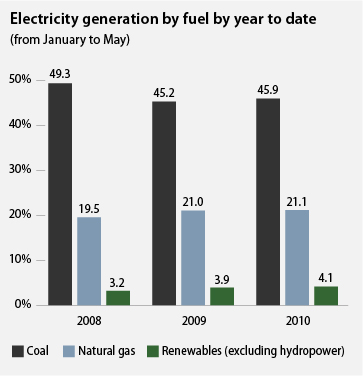Senators from coal states who are trying to protect big coal companies from the impact of global warming pollution reductions may only hasten the decline of big coal.
Their efforts include opposition to clean energy and global warming legislation and blocking EPA from setting pollution limits on the largest emitters. Meanwhile, coal’s share of electricity generation declines while the shares of natural gas and renewable energy generation increase. And more declines in coal use are forecast.
A recent independent government analysis found that coal senators’ plan to invest in so-called “clean coal technology” to reduce global warming pollution from power plants are unlikely to succeed without putting a price on this pollution, which is also essential to producing revenue to invest in this emerging technology. Moreover, the public strongly backs EPA efforts to set pollution reduction requirements.
The latest effort by some senators from coal states to block global warming pollution reductions from coal-fired power plants in order to “protect” U.S. coal companies occurred on September 15. They participated in a rally organized by big coal companies to oppose EPA reductions in global warming pollution. AP reports:
The industry-backed group Faces of Coal paid for most of the travel and lodging expenses for the coal miners, who came from West Virginia, Virginia, Kentucky, Pennsylvania and Ohio.
At the rally these senators attacked EPA’s steps to reduce global warming pollution that were necessitated by the Senate’s failure to pass similar legislation. Yet most of these same senators opposed efforts by Sens. John Kerry (D-Mass.) and Joe Lieberman (I-Conn.) to pass the American Power Act that would have provided billions of dollars to develop and deploy carbon capture-and-storage technology or CCS that would enable power plants to burn coal with dramatically less carbon dioxide pollution. This would have provided a smooth transition toward a significantly lower carbon economy with little impact on coal consumption.
After blocking the American Power Act these senators now train their fire on EPA’s compliance with the Clean Air Act that requires it to set global warming pollution reductions as mandated by the U.S. Supreme Court. EPA plans to focus on the largest sources first — those that emit more than 75,000 tons of carbon pollution annually. Nonetheless, big polluters falsely claim that EPA pollution reductions would affect “farms to even American homes.” Shamelessly, after blocking congressional action these senators now argue that only Congress — and not EPA — should set such pollution limits.
For instance, Sen. Byron Dorgan (D-N.D.), who repeatedly opposed reductions in global warming pollution, wants to block EPA reductions so Congress can act.
I do think that it makes sense to have some time here to have Congress make the ultimate decision rather than EPA.
But even without global warming pollution reductions the U. S. Energy Information Administration found that coal’s share of electricity generation has slipped while natural gas and renewable electricity are on the rise over the last three years.

Coal’s future could be even bleaker. A recent analysis by the The Wall Street Journal found that:
Power companies are increasingly switching to natural gas to fuel their electricity plants, driven by low prices and forecasts of vast supplies for years to come.
While the trend started in the late 1990s, the momentum is accelerating and comes at the expense of coal. Some utilities are closing coal-fired plants; others are converting them to run on gas.
The switch is occurring globally and is getting a push from regulators who want to limit emissions that contribute to climate change, haze and health problems such as respiratory illness. Though efforts in Congress to pass legislation attaching a price to carbon emissions appear stalled for now, utilities still anticipate eventual carbon restrictions. The Tennessee Valley Authority, for example, recently announced a 20-year development plan that emphasizes nuclear and gas, and includes fewer coal units.
Coal-burning facilities are expected to slip to 10% of total new capacity in the U.S. in 2013, down from 18% in 2009, the U.S. Energy Information Administration reports. Gas, meanwhile, is expected to soar to 82% of new capacity in 2013 from 42% last year.
Big coal companies should be most concerned with the projection that there will be a nearly 10 percent decline “in coal-fired generation, 2015 versus 2009.” Much of this decline will be due to the retirement of old, inefficient coal-fired power plants that will be too expensive to adapt to new public health standards for sulfur and mercury air pollution. It is also due to uncertainty about future global warming reductions — investors are reluctant to bet on new coal plants until it is clear whether and how many reductions in global warming pollution are required. Delaying EPA health standards on global warming pollution would only prolong uncertainty and further delay investments in new coal plants.
Some senators from coal states want the federal government to invest billions of dollars into CCS research rather than require reductions in global warming pollution because they view this nascent technology as a silver bullet that can reduce pollution while allowing coal combustion.
For instance, Sens. Jay Rockefeller (D-W.Va.) and George Voinovich (R-Ohio) introduced the Carbon Capture and Storage Deployment Act, S. 3591. It would provide $850 million in federal research money for CCS as well as raise $2 billion annually from a “wire charge” (a levy or tax) on all fossil-fuel-generated electricity.
There are two fundamental problems with this approach. First, there would be no market for CCS technology unless there are global warming pollution reductions in place. The Government Accountability Office concluded that a mandatory reduction in carbon pollution was essential for CCS to blossom.
Without a tax or a sufficiently restrictive limit on CO2 emissions, plant operators lack an economic incentive to use CCS technologies. Reports by IPCC, NAS, and the Global CCS Institute have all highlighted the importance of a carbon policy to incentivize the use of CCS.
Second, without a pollution reduction program to generate revenue to invest in CCS research and development, some of the money for it will have to come from general revenues. The large federal budget deficit, however, has fueled opposition to more government spending. APA and the America
n Clean Energy and Security Act, H.R. 2454, would have provided billions of dollars for CCS research using revenue raised from selling pollution dumping permits under global warming pollution reduction legislation. It is difficult to imagine Congress appropriating money for CCS when so many existing programs will be facing severe budget cuts.
The senators’ strategy of attempting to stave off pollution reductions from coal-fired power plants also flies in the face of overwhelming support for such health protections. A just-conducted poll conducted by Infogroup/Opinion Research Corporation for the Natural Resource Defense Council found strong bipartisan support for EPA to limit global warming pollution from power plants.
About three out of four Americans (73 percent) support “protecting the U.S. Environmental Protection Agency’s authority” to “take steps that will reduce greenhouse gas emissions from electric utilities and other major industrial polluters.” Support is fairly evenly divided between “strongly” (38 percent) and “somewhat” (34 percent).
By contrast, only about one in four Americans (24 percent) oppose the EPA’s authority to control carbon dioxide pollution, with just 15 percent in the “strongly oppose” category.
Little variation is seen among regions in the level of support for the EPA’s authority to regulate greenhouse gas emissions: Northeast (75 percent); Midwest (68 percent); South (72 percent); and West (75 percent). A majority of Republicans (54 percent), Independents (78 percent) and Democrats (91 percent) favor protecting the EPA’s authority.
The poll further found that if Congress’s efforts to stop EPA from setting pollution limits succeed people would feel that Congress would be letting special interests off the hook.
Seven out of 10 Americans (71 percent) agree with the following statement: “If Congress blocks the U.S. Environmental Protection Agency from doing its job of reducing greenhouse gas emissions from electric utilities and other major industrial polluters, it would send the wrong message to polluters, namely, that Congress isn’t willing to hold polluters accountable.”
A majority of Republicans (55 percent), Independents (70 percent), and Democrats (89 percent) agree with this statement.
Rockefeller said at the rally funded by big-coal, “I don’t want somebody who is not elected, whose agency is divided by all kinds of stovepipes, telling us what we ought to do.” But the poll found that Americans believe that “scientists and other experts at the EPA are ‘the most qualified to make decisions about how best to safeguard the American public when dealing with greenhouse gas emissions and other major pollutants,’ compared to fewer than one in 10 Americans (9 percent) who said Congress should make such decisions.” Rockefeller may want Congress to make these decisions, but Americans clearly prefer technical experts to do so.
Among senators from coal states there was no greater defender of the industry than the late Sen. Robert Byrd (D-W.Va.). He, however, implored West Virginians to embrace a clean energy future rather than resist it — much like his prescient 2002 warnings about the looming disaster of an Iraq invasion. In one of his last Senate speeches given in opposition to another effort to block EPA from reducing carbon pollution he called for investments in CCS technology as part of global warming pollution reductions.
The regulation of greenhouse gasses is approaching, whether done by Congress or by regulation, despite naysayers who rail about the nonexistence of climate change.
This resolution, I fear, would have a sweeping impact. It could preclude action to reduce our nation’s dependence on foreign oil. It could delay critical investments in clean coal technologies. That’s not a national energy strategy I can or want to support. My vote today against the Murkowski Resolution is a vote for coal’s future and my intention to continue to have a seat at the table and a voice for West Virginia in how we legislate our energy future.
Byrd understood that blocking action on pollution reductions could postpone expenditures that could save coal by investing in CCS and other measures that allow coal combustion with much less pollution as part of comprehensive reduction plan.
At a September 8 speech in West Virginia, Rockefeller rebuked those who deny the existence of global warming. He also acknowledged that the uncertainty Byrd warned about could delay investments in new coal powered plants, saying, “Wall Street — including a number of our biggest customers for West Virginia coal — are withholding job-generating new investments due to uncertainty in the law.” Yet his efforts to block EPA pollution reductions only prolongs and exacerbates this uncertainty.
The coal senators’ efforts to protect coal companies ignore Byrd’s warning. Preventing reductions in global warming pollution by Congress or EPA would prolong uncertainty for investors, ignore public opinion, and deprive a market and revenue essential to develop and deploy the technology necessary to ensure coal’s long-term future. By trying to save coal from pollution reductions these senators could end up destroying it.




